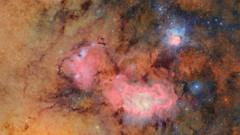**Fifty years after Apollo, the remaining Moonwalkers reflect on their journeys as humanity prepares to embark on lunar exploration anew.**
**The Last Moonwalkers: The Living Legends of Apollo**

**The Last Moonwalkers: The Living Legends of Apollo**
**As the Artemis program aims to return humans to the Moon, we remember the surviving astronauts who once made history on its surface.**
The Apollo missions of the 1960s and 1970s forever etched our exploration of space into the annals of history. Among those pioneers were the 24 astronauts who journeyed to the Moon, and as the community mourns the loss of Apollo 13 commander Jim Lovell, only five remain who have set foot beyond Earth's orbit.
NASA's Artemis program is planning its much-anticipated return to the Moon, with aspirations of establishing a sustainable human presence there by the end of this decade. In contrast, China has made notable strides, recently landing a probe on the Moon's far side, with the goal of achieving crewed lunar exploration by 2030. Despite private companies vigorously pursuing lunar missions, setbacks have plagued many of their attempts, highlighting the challenges inherent in this complex field.
NASA had initially scheduled the Artemis 2 mission, its first crewed lunar venture since Apollo 17, for last year, but has since postponed it to 2026 to ensure thorough preparation. Major aerospace firms like SpaceX and Boeing are also engaged in cutting-edge developments to support space travel, albeit facing significant technical hurdles.
Jim Lovell was part of the historic Apollo 8 mission, which orbited the Moon in 1968. His intended mission for Apollo 13 took a dramatic turn, becoming a testament to human resilience. Following his career at NASA, Lovell delved into telecommunications, sadly losing his wife, Marilyn, in 2023.
Now, what of the surviving Apollo astronauts? What are their stories?
**Edwin "Buzz" Aldrin (Apollo 11)** was the second to walk on the Moon during the historic 1969 mission, a moment clouded by the fact that he was not the first. Though sometimes overshadowed by Neil Armstrong, Aldrin has become an advocate for continued lunar and Martian exploration. He recently married for a fourth time at the age of 93.
**Charles Duke (Apollo 16)** became the youngest person to walk on the Moon at 36. He is also known for his pivotal role as Capcom during the Apollo 11 landing. Duke remains excited about NASA’s Artemis goals but cautions about the difficulties posed by the Moon's South Pole.
**Fred Haise** served on the ill-fated Apollo 13 mission, which captured global attention after an onboard explosion forced the crew to abort their lunar landing. Haise never got to set foot on the Moon, as later missions were canceled, yet he continued contributing to the aerospace industry as a test pilot.
**Harrison Schmitt (Apollo 17)** made history as the first scientist to walk on the Moon, becoming part of the last crewed mission in December 1972. Following his NASA tenure, he served a term in the U.S. Senate and has garnered attention for his contrasting views on climate change.
Lastly, **David Scott (Apollo 15)**, who drove the Lunar Roving Vehicle across the Moon, has managed a prolific career beyond his pioneering lunar mission, participating in projects that have shaped public perception of space travel.
As the next generation gears up for lunar exploration, it remains to be seen what new frontiers these living legends will inspire. They are not merely the last Moonwalkers, but a bridge connecting the storied past of space exploration with an exciting future that awaits.




















